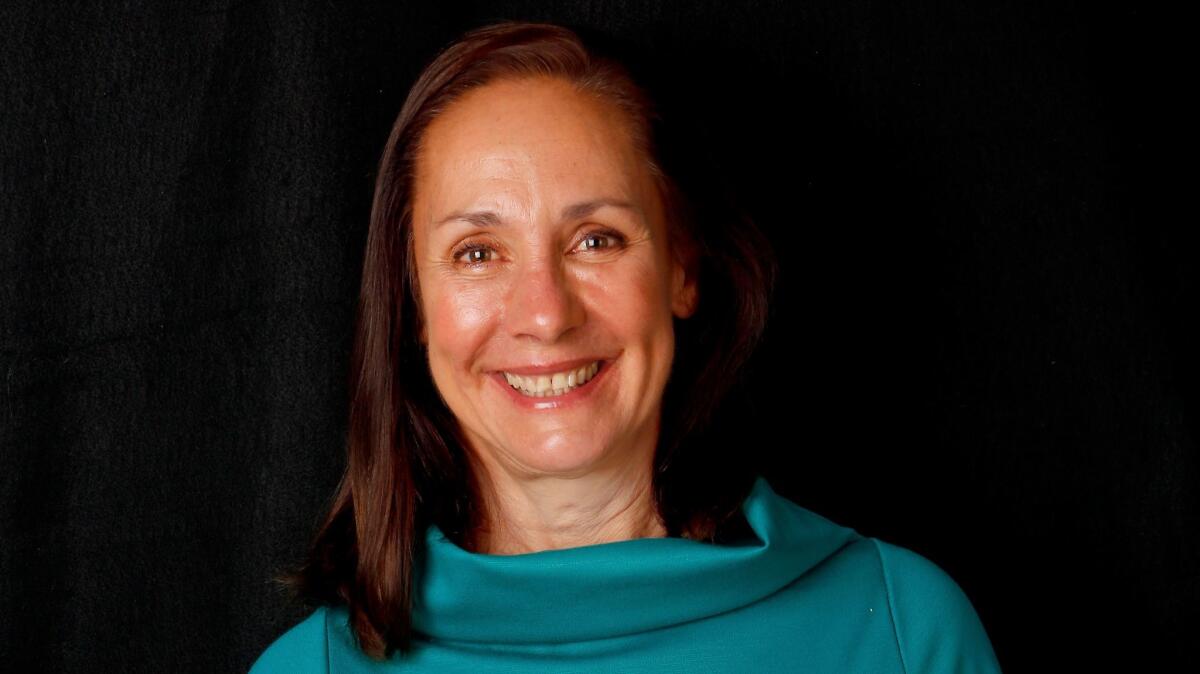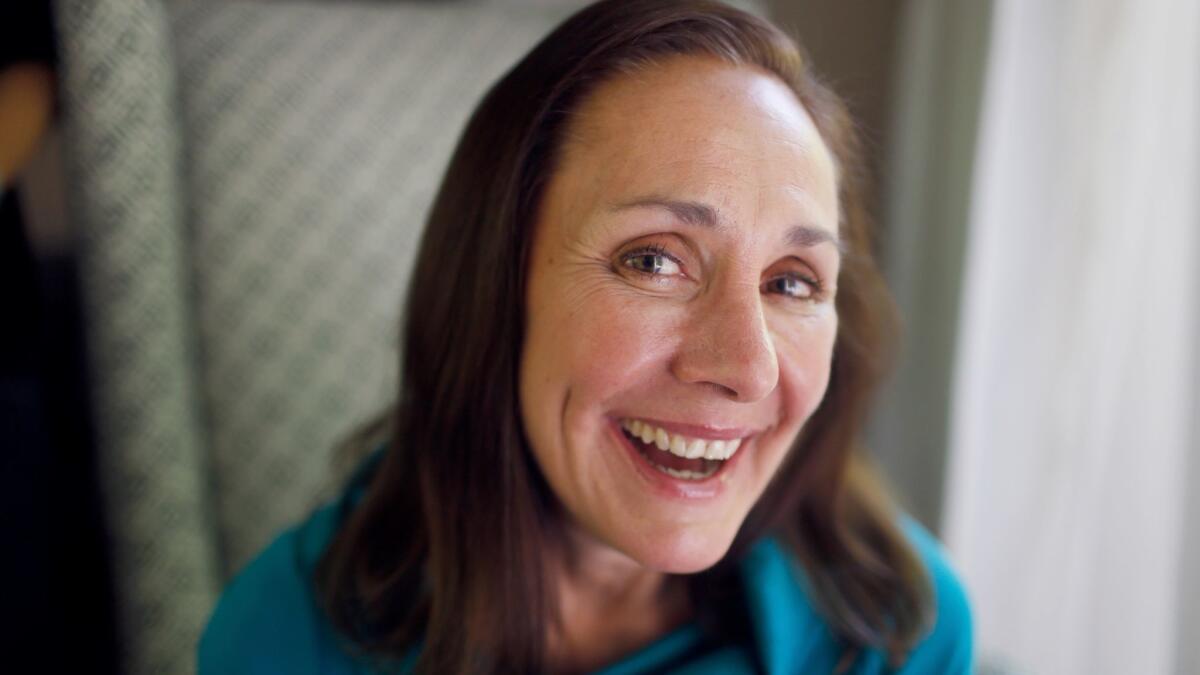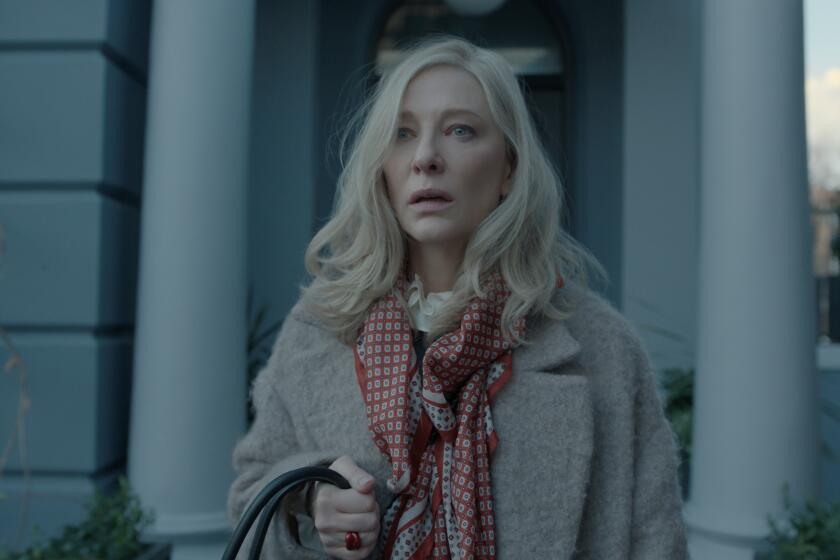The secret to Tony Award nominee Laurie Metcalf’s success? Brilliance and a whole lot of hard work

Reporting from New York — For many aspiring thespians, the dream is to become a working actor. For Laurie Metcalf, a three-time Emmy-winner for her role as hapless Jackie on the sitcom “Roseanne” and a strong contender to take home the Tony Award on Sunday for her virtuoso turn as Nora in Lucas Hnath’s “A Doll’s House, Part 2,” the goal has always been to be a hard-working actor.
Metcalf has a ritual. Before every performance, she marches onto the stage and runs her lines. All of them. It makes no difference if it’s the first preview or the closing night. Or whether the show is being done on Broadway or at a tiny venue on Melrose Avenue.
Sitting in her dressing room at the Golden Theatre after a Sunday matinee, Metcalf called her pre-show routine “a real drag.” But she’ll never be one of those actors who arrives at the theater a second before the stage manager’s half-hour call.
“I hate it, but the reason I go through the play beforehand is that I want to be up to speed,” she explained. “I want to be thinking as quickly as I need to as soon as I hit the stage. I want to have a vocal warm-up. I want my mouth to be able to work as fast as my thoughts, especially in a play that is as quick as this one. I wish I could wean myself off it, but I do a little. We’re halfway through the run now and I go down and do my monologues and then I come up here and do the rest of the play while getting ready.”
Sprawled out in a chair next to a partially completed jigsaw she works on between performances on two-show days, Metcalf is in her element when inside a theater. “Oh look, there’s my Drama Desk nomination!” she joked with faux diva drollery, showing me the certificate that rested near an open bottle of wine.
The 2016-17 Broadway season will be remembered chiefly for three powerhouse performances: Bette Midler as Dolly Levi in Jerry Zaks’ joyful revival of “Hello, Dolly!” Ben Platt in the title role of the hit new musical “Dear Evan Hansen,” and Metcalf as the renegade wife returning to the home she left behind in Hnath’s scintillating sequel to Ibsen’s “A Doll’s House.” A youthful 61-year-old theater veteran, Metcalf has been nominated three previous times for a Tony (“Misery,” “The Other Place” and “November”), and to the minds of many in the Broadway community, this award is overdue.
Realism is the default for writers and actors today, but the universe that Hnath constructs is pure theatrical quicksilver. (My high-class companion described this comedy of ideas as Ibsen rewritten by a modern-day George Bernard Shaw.) In a cast in which all four actors (including Chris Cooper, Jayne Houdyshell and Condola Rashad) are nominated for Tonys, Metcalf stands out for her high-flying daring. Watching her in Sam Gold’s production, I couldn’t help thinking of all the playwriting styles she had to absorb to be this bold in body and mind.
The world premiere of “A Doll’s House, Part 2” took place two weeks before the Broadway opening at South Coast Repertory, which commissioned the play. Shannon Cochran, a terrific dramatic actress, played the role of Nora in a production directed by Shelley Butler that underplayed the comedy. I didn’t realize just how funny Hnath’s play was until I experienced Metcalf extracting comic gold from lines that, as it turned out, only needed her vocal swoops and exasperated eye bulges to set an audience into hysterics.
Balancing piquant comedy with astringent drama is no easy task, but Metcalf makes it seem effortless. One of her trademarks is combining top dog intensity with underdog humanity, and here she manages to make Nora’s fierce convictions seem at once completely reasonable and totally one-sided.
“I tend to root for characters who have a lot of negative qualities, but what’s driving them forward is their passion,” Metcalf said. “They’re on a mission, and maybe their approach is misguided, but you can’t fault them for giving 150%. Nora can be very selfish, very self-righteous at times, very aggressive, very stubborn. I find those qualities funny to watch in someone, but there also has to be a couple of drops of humanity to make the character three-dimensional.”
Bart DeLorenzo, who co-directed Metcalf in Justin Tanner’s comedy “Voice Lessons,” which had its premiere at the Zephyr Theatre in 2009, said in a phone interview that what he finds so exciting about her acting is her ability to expose “the contrast” in characters. “We did an outrageous farce, yet she was able to find the tragic element of the character,” he said. “Conversely, in dramatic roles, she’s able to find the comic aspects.”
An actor’s actor, a stage athlete, a gritty comic performer with an unimpeachable work ethic, Metcalf describes herself simply as “an interpreter.”
“When I get a beautifully written piece of material, I immediately start imagining how I would interpret it,” she said. “I love just daydreaming about it for months, breaking it down, seeing where I can spin something. How I can turn this into the most fun ride for the audience that I can make it? That’s my job.”
Metcalf prefers performing in contemporary plays because she likes “to be loose onstage and not tied up with preconceived notions of what a period piece should be.” She also admitted that she tries to avoid seeing other actors perform roles that she’d like to play. “When you see something, you just accept that’s the way the character should be when it’s only one person’s interpretation,” she said. “There are a couple of plays that I’ve stayed away from, like ‘Who’s Afraid of Virginia Woolf?’ which I’ve always wanted to do but am quickly aging out of.”

How I can turn this into the most fun ride for the audience that I can make it? That’s my job.
— Laurie Metcalf, on taking on a new part
Metcalf’s interest in “A Doll’s House, Part 2” was piqued by the title. “I thought, ‘That’s pretty cheeky, whoever this Lucas Hnath is.’ I was pleasantly surprised by the out-and-out laugh lines that are built into the play, which made me think we could find more humor in it.”
The script was still gestating when it was sent to Metcalf. The Broadway cast went through two workshops with Hnath and Gold. There was apparently a lot of give and take. Changes were being made during the preview period. Metcalf pulled out her script to show me the eleventh-hour rewrite of her last lines.
“For a play going to Broadway, you’d assume that nerves would be high in the rehearsal room,” she said. “But it was very relaxed, and everyone was committed to making it the best show it can be.” Knowing from past experiences how the situation could have unraveled, she added, with a mix of appreciation and relief, that she’d love to work again with Hnath, a rising talent whose play “The Christians” was produced at the Mark Taper Forum in 2015.
Born and bred in the Midwest, Metcalf graduated from Illinois State University, where she met Terry Kinney, Jeff Perry (who became her first husband) and John Malkovich, a group that could make the Yale School of Drama green with envy. Kinney, Perry and Gary Sinise, a former high school classmate of Perry’s, went on to found Steppenwolf Theatre Company, with Metcalf and Malkovich as charter members.
“We initially thought it would last a summer,” she recalled. “We found a church basement and picked four one-acts. And then we did another play. It just dribbled out. We found that we shared the same sensibilities, the same sense of humor. We liked to be daring. We liked to try to make each other laugh or cry. We had a lot of energy and didn’t know where to channel it except onstage. They called it rock ’n’ roll theater because it was just so in your face.”
The thrill of these early days resounded in Metcalf’s voice as she retraced her Steppenwolf journey from a suburb of Chicago. “I don’t know that we could have done it had we not been in our early 20s,” she said. “It was a lucky accident that we were sort of isolated up in Highland Park in the beginning. We didn’t realize that we had some really good actors and directors in the mix. Fortunately, we didn’t have agents swooping in to steal some of us. We were off the radar and allowed to evolve.”
The stage was their MFA program. “We learned by doing roles that we would never have been cast in otherwise,” she said. “Because we were so small, I had to play Malkovich’s mother in Sam Shepard’s ‘True West.’ I had to play the 13-year-old girl in Lanford Wilson’s ‘Fifth of July.’ These were parts I learned from, and our audience was willing to let us do that. We had a very forgiving and loyal audience. You just can’t be on the fast track. I had years of being a secretary.” (And yes, she confirmed, she was a damn good one.)
New York got its first taste of Metcalf when she appeared in a revival of “Balm in Gilead,” Wilson’s study of New York’s seedy underbelly. She played Darlene, a naive working girl from Chicago, and still hears regularly from theatergoers who vividly remember the way she reeled off her character’s marathon monologue.
“It was a fantastic time to be performing in New York,” she said. “Sam Shepard was doing ‘Fool for Love,’ David Mamet was doing ‘Glengarry Glen Ross.’ The shows had so much muscle. Bruce Springsteen and Tom Waits came to see us at little Circle Rep. It was just a really exciting moment.”
French Stewart, who co-starred in “Voice Lessons” and has an extensive working history with Metcalf, sent me a Facebook message listing the “five things that must be known” about his friend and colleague: “1. She’s the best actor on the planet. 2. People don’t know this because she’s the shyest person there is. 3. She can type very fast, Charles. Unbelievably fast. 4. To make her laugh hard is to experience a great laugh. 5. Her [Bull] Detector is undeniable.”
To say that Metcalf likes to keep busy would be an understatement. Performing in challenging plays (such as Nick Jones’ “Trevor” at Atwater Village Theatre) is how she keeps her technique flexible and razor-sharp. She’s already on board to co-star in Edward Albee’s “Three Tall Women” on Broadway next year with two-time Oscar winner Glenda Jackson. (“I can’t wait to get in a room with her and director Joe Mantello,” she said when hearing about Jackson’s intrepid performance as Lear last fall in London.)
Metcalf isn’t known to be a shrinking violet in rehearsal. She has acted too long to suffer auteurs gladly. What is it that she seeks from a good director?
“I like being trusted that I’ll be able to figure out the technical stuff,” she said. “It sounds boring, but in the opening few minutes of our play there are a lot of decisions that had to be worked out. Where does the hat go? When do the gloves come off? How do I get rid of them? When you’ve worked this stuff out, it looks natural, but these little details can be maddening. So I like to be trusted that I can figure this stuff out on my own. And then I like to feel confident that a director has my back and can tell me when that’s too big or too emotional or just too much. Because generally I start at 100 miles an hour, so I like being told to rein things in. I like being told that’s funny but the wrong time to have a laugh. I like knowing that someone is out there looking at the big picture.”
SIGN UP for the free Essential Arts & Culture newsletter »
Metcalf’s enthusiasm for the minutiae of her craft attests to her devotion. “I am the luckiest person in the world that my passion for the theater hasn’t faded a bit,” she said. “I have friends who have burned out on it, and I know the schedule can be rough. It takes a toll. But it doesn’t get any better for me than when I’m in a rehearsal room attacking something new. I feed off it. In between shows, I just go sort of limp. I don’t know where to direct my energy.”
Her next gig after “A Doll’s House, Part 2” is a familiar one: “Roseanne,” which is returning to ABC for eight episodes next year. Metcalf said she can’t wait to see where Roseanne Barr takes the show.
“A lot of people know this family, and so to stick them in 2017 is going to be really timely and relevant,” Metcalf said. “The small town in Illinois will have definitely changed in the last 20 years, and maybe there’s a rift in the family over who voted for whom. I’m sure Roseanne will deal with the realities of what the Conner family is facing.”
Metcalf admitted that it’s easier for her to play working class than rich. “If I were to play someone affluent, I would try to look the right way, but it wouldn’t feel as natural,” she said. “I’d be playing a character I don’t truly understand.”
Her range is wider than she lets on, but there’s something noble about Metcalf’s embrace of lunch pail culture. It’s easy to mythologize great talent, but too often diligence is overlooked. Brilliance evaporates with laziness. When asked about her acting heroes, Metcalf reveals not only what she values most but the reason so many hold her up as their ideal.
“Well, I really admire Meryl Streep,” she said without much of a pause. “People who make it look so easy are generally people who work really hard. Nathan Lane does it too. I admire that work ethic. I don’t think it’s right to settle. I challenge myself to keep working to make it better. Ultimately, it’s not for me but for the audience. I want to wring every drop of juiciness out of every character. I want it to be surprising. I want there to be laughs in places you wouldn’t expect. I feel that’s what I owe. The worst thing in a play is to be boring. That’s unacceptable.”
Follow me @charlesmcnulty
MORE THEATER COVERAGE
A critic’s take: Kudos for inventive shows that take risks
2017 Tony Awards: The complete list of nominations
These teachers waited in line nearly 24 hours to be first for ‘Hamilton’ L.A. tickets
More to Read
The biggest entertainment stories
Get our big stories about Hollywood, film, television, music, arts, culture and more right in your inbox as soon as they publish.
You may occasionally receive promotional content from the Los Angeles Times.











